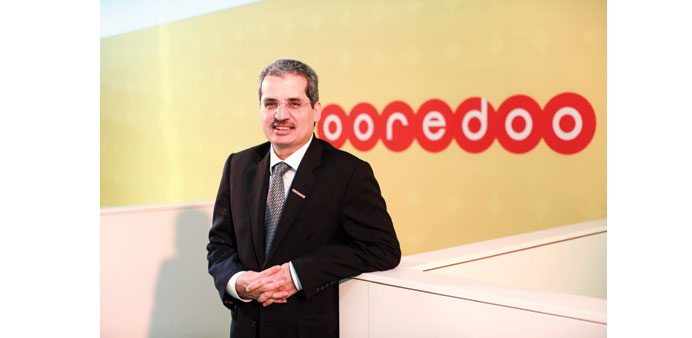Bloomberg
Paris/ Barcelona
Ooredoo, the Qatari-owned phone carrier that has expanded into Indonesia, is seeking network-sharing deals from Africa to Asia as it seeks to bring mobile Internet to more countries while limiting spending.
The company is also open to small and mid-sized acquisitions and expects carriers in its markets to merge to cut costs, chief executive officer Nasser Marafih said in an interview in Barcelona. Ooredoo’s focus though is on sharing infrastructure to keep expenditure in check, he said. “It’s best to share infrastructure - competition in the future will be on the services,” Marafih said, speaking at his company’s stand at the Mobile World Congress. People want to use services like Facebook on their phones, so carriers will compete to provide them first and better, he said. Data makes up about a fifth of Ooredoo’s revenue, Marafih said.
Ooredoo is pushing mobile-Internet plans to subscribers from Algeria to Myanmar to boost revenue and has sold assets like wireless towers to improve earnings. The company a year ago divested some of its towers in Indonesia, has exported that “asset-light” model to Myanmar, and also plans to use it to expand in other markets.
To help sell subscriptions that include more than just calls, Marafih is betting on partnerships with the likes of Google and Facebook to package their services into Ooredoo’s offerings. Cheaper smartphones will also help expand data usage, he said.
Marafih is in talks with Facebook about an offering in Indonesia, where Ooredoo has about 60mn subscribers. He said he’s already signed an agreement with Google in the country to charge application purchases straight to the phone bill.
Expanding in emerging markets is the next frontier for Internet giants. Facebook CEO Mark Zuckerberg this week in Barcelona discussed broadening Internet projects in regions including Africa.
Ooredoo is negotiating with the Algerian government about deploying high-speed 4G Internet access and, in Iraq, it got a licence to deploy 3G networks, Marafih said.
Potential is significant in Iraq despite current political turmoil, the executive said.
“There are some security concerns; that scares a lot of carriers away from that market, but we see a big opportunity,” Marafih said. “We’re optimistic about Iraq in the long term - the appetite for data is everywhere.”

Nasser Marafih, chief executive officer of Ooredoo Group, poses for a photograph at the Mobile World Congress in Barcelona, Spain on Tuesday. Data mak
